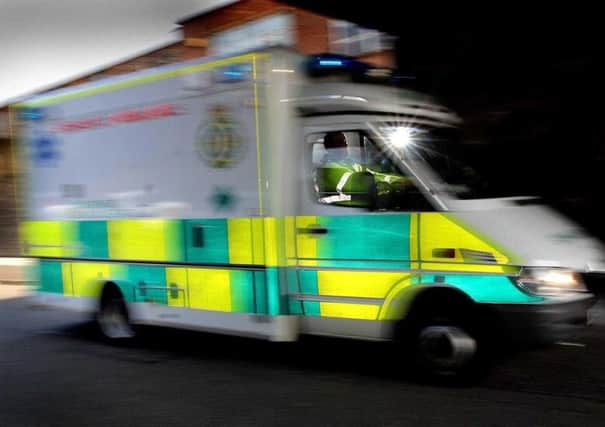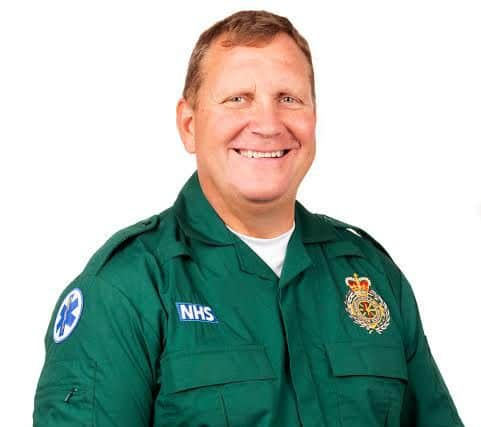Paramedics enforced meal breaks trial '˜will risk lives,' says worker


Crews working for the North East Ambulance Service (NEAS) used to be given £5 if they missed or had to have a late meal during their shifts.
Now, service chiefs have introduced staggered meal breaks between 9am and 12pm, while control room staff will restrict crews responses to “Red One” calls - the most serious incidents such as people who are not breathing and do not have a pulse.


Advertisement
Hide AdAdvertisement
Hide AdIn an article in the NEAS staff magazine, it is said between 40 and 50% of operational staff are receiving late meal breaks on a daily basis.
The report says: “Late meal breaks occur whn a high number of calls are categorised as life threatening and as a result of workforce issues, increased job cycle times and excessive hospital handover times.
“They can result in fatigued staff, which can have an impact on patient safety and the costs associated have been estimated at over £700,000 each year along with a loss of productivity and reduced capacity.”
The report says this can lead to fatigued staff, impacting on patient safety and costs estimated at £700,000 a year.


Advertisement
Hide AdAdvertisement
Hide AdParamedic crews are required to take two half-an-hour meal breaks during their 12-hour shifts.
Bosses have denied that the move is aimed at saving money and say tired staff are more likely to make mistakes, making it important that they have taken breaks and feel refreshed before treating patients.
Union chiefs say they are aware of the ongoing situation with meal breaks within the service and that members have raised the issue of patient safety with managers.
One worker with the service, who wished to remain anonymous, today claimed that lives were being put at risk as ambulances must be off road while staff are taking the breaks.
Advertisement
Hide AdAdvertisement
Hide AdThe employee said: “This practice is having an effect of taking emergency ambulances off the road for meal breaks thus not being able to respond to potentially life-threatening emergencies.
“This is a practice that most if not all frontline ambulance staff feel very strongly about we are very much against this practice, yet are afraid to speak out for fear of reprisal.
“In short this new trial is and has put lives at risk.”
Speaking in the magazine for staff at NEAS Paul Liversidge, chief operating officer at the organisation, said: “Employees have been telling us that meal breaks were one of the biggest frustrations and as a result it has been high on our agenda.
“Staff welfare is key to patient safety and we know how much late meal breaks impact upon crews.
Advertisement
Hide AdAdvertisement
Hide Ad“We need everyone’s support to help make this trial a reality for all emergency care staff so that we can minimise the times where operational staff receive late breaks, whilst still meeting the needs of the public who dial 999 to access services.”
Bosses also argue that the move will result in a more even availability of resources to respond to Red Two calls, classed as serious but not life-threatening.
The service usually receives 35 Red One calls out of a total of 1,050 calls per day.
What the ambulance trust said:
In a statement on the meal breaks trial, Mr Liversidge said: “Ambulance crews who treat patients on a daily basis typically work between eight and 12 hour shifts in often tough, mentally and physically challenging situations.
Advertisement
Hide AdAdvertisement
Hide Ad“In some cases hospital handover delays and high demand for ambulance services can see crews working over 12 hours, which makes the rest break even more important.
“The law is clear that ambulance staff need to have rest breaks, typically every six hours of work, something which all UK NHS ambulance services and staff representatives fully support.
“It is important that our employees get these breaks during their shifts to ensure they stay healthy and keep themselves nourished and hydrated so that they are able to provide a safe service to the public.
“Tired staff are more likely to make mistakes so it is especially important that those treating patients are refreshed when they arrive to treat their patient.
Advertisement
Hide AdAdvertisement
Hide Ad“Every effort is currently made to minimise the times where operational staff receive late breaks, whilst still meeting the needs of the public who dial 999 to access services.
“We will always prioritise the nearest available resource to an immediately life threatened patient and it is important to remember that ambulance staff will often voluntarily stop their breaks in order to get to immediately life threatened patients quickly.
“Rest break allocation will always be challenging in an emergency service and to try and overcome these challenges we have introduced a new trial policy to bring NEAS in line with all other ambulance trusts around the UK.
“During the trial, rest breaks are staggered and crews are only deployed to the most serious life threatening calls (Red One) during the meal break period.
Advertisement
Hide AdAdvertisement
Hide Ad“This allows us to better manage break periods over a longer period resulting in more staff being available to respond to patients.
“Our motivation to make changes is entirely based on staff welfare and patient safety, not financial gain.
“We expect all staff to report any incident of patient or employee safety so that it can be fully investigated and learning identified.
“We would encourage any member of staff with a concern to raise it with their manager.
“Where a member of staff does not feel comfortable doing that, the trust’s whistleblowing policy ensures any member of staff is able to raise a concern anonymously and without fear of reprisal.”